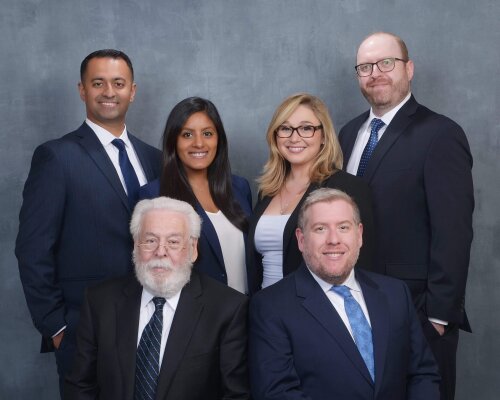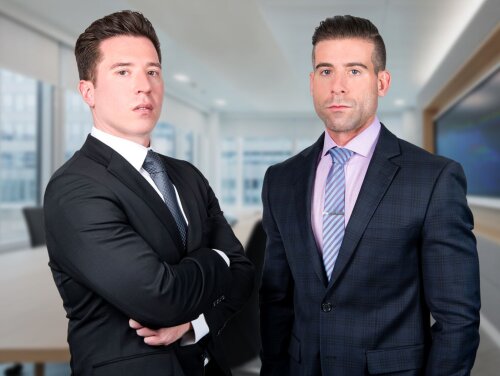Best Commercial Litigation Lawyers in Philadelphia
Share your needs with us, get contacted by law firms.
Free. Takes 2 min.
List of the best lawyers in Philadelphia, United States
About Commercial Litigation Law in Philadelphia, United States
Commercial litigation covers legal disputes that arise out of business relationships and commercial transactions. In Philadelphia these disputes commonly involve breach of contract, nonpayment, partnership and shareholder disputes, business torts such as fraud or unfair competition, disputes over leases and commercial real estate, collection of business debts, and claims arising under the Uniform Commercial Code - especially sales and secured transactions. Cases can be heard in state court - typically the Philadelphia Court of Common Pleas - or in federal court when federal law or diversity jurisdiction applies. Commercial litigation often involves complex factual and financial issues, significant document discovery, expert witnesses, and a focus on practical remedies such as damages, injunctions, or specific performance.
Why You May Need a Lawyer
You may need a commercial litigation lawyer in Philadelphia if you face any of the following situations -
- A business counterparty has breached a contract or failed to pay for goods or services.
- A partner, co-owner, or shareholder is acting in a way that harms the business or breaches fiduciary duties.
- You are accused of breaching a commercial contract, committing a business tort, or violating regulatory requirements.
- There is a dispute over commercial leases, real estate transactions, or construction projects.
- You need urgent relief, such as a temporary restraining order or preliminary injunction, to protect business assets or preserve the status quo.
- You need help enforcing a judgment, collecting a debt, or pursuing remedies across state lines.
A lawyer can evaluate the strengths and weaknesses of your case, advise on potential remedies and exposure, manage procedural requirements and discovery, negotiate or mediate settlements, and represent you at trial or on appeal.
Local Laws Overview
Key legal and procedural points relevant to commercial litigation in Philadelphia include -
- Court structure - Philadelphia County civil cases are generally filed in the Court of Common Pleas - Civil Division. Federal commercial cases in Philadelphia are heard in the U.S. District Court for the Eastern District of Pennsylvania.
- Governing substantive law - Many commercial disputes are decided under Pennsylvania common law and statutes, including contract law, tort law, and statutory remedies. The Pennsylvania Consolidated Statutes and Pennsylvania case law govern many claims. Where applicable, federal statutes or federal question jurisdiction will control.
- Uniform Commercial Code - Pennsylvania has adopted the UCC. Articles commonly at issue in business disputes include Article 2 for sale of goods and Article 9 for secured transactions and remedies against collateral.
- Statutes of limitation - Time limits for bringing claims vary by cause of action. Breach of written contract is generally subject to a four-year limitation period under Pennsylvania law, while other claims such as certain torts may have shorter timeframes. It is critical to check the exact statute of limitation for your claim to avoid losing rights.
- Procedural rules - State cases follow the Pennsylvania Rules of Civil Procedure and local rules for the First Judicial District. Federal cases follow the Federal Rules of Civil Procedure and the Eastern District local rules. These rules govern pleadings, motions, discovery, summary judgment, trial practice, and appeal timing.
- Alternative dispute resolution - Mediation and arbitration are commonly used. Many commercial contracts include binding arbitration clauses or mandatory mediation before litigation. Courts also frequently encourage settlement through mediation programs.
- Remedies and costs - Remedies can include monetary damages, specific performance, injunctive relief, and declaratory judgments. Attorneys' fees may be recoverable if a statute or contract provides for fee-shifting. Litigation can be expensive and time-consuming, and cost management and realistic evaluation of likely recovery are important.
Frequently Asked Questions
What is commercial litigation and how does it differ from other types of lawsuits?
Commercial litigation is a category of civil litigation focused on disputes between businesses or businesses and individuals arising from commercial activities. It differs from personal-injury litigation, family law, and criminal law because it centers on business relationships, contracts, corporate governance, and commercial statutes rather than bodily harm, family matters, or criminal offenses. The issues are often contract, finance, or corporate governance related and may require specialized financial or industry expertise.
When should I contact a commercial litigation attorney in Philadelphia?
Contact an attorney as soon as you suspect a serious dispute or irreparable harm - for example when a counterparty breaches a key contract, when there is a risk of asset dissipation, when deadlines like statutes of limitation may be approaching, or when you are served with litigation documents. Early counsel can help preserve evidence, assess legal claims, and pursue pre-suit resolution or emergency relief.
How do I choose the right lawyer for my commercial dispute?
Look for a lawyer with experience in commercial litigation relevant to your industry and the type of dispute you face. Ask about trial and settlement experience, knowledge of local courts, fee structure, and whether the attorney uses outside experts or analysts for financial or technical issues. Request references and a clear engagement letter that explains fees, billing, and expected milestones.
What does litigation usually cost in Philadelphia?
Costs vary widely based on case complexity, discovery needs, expert witnesses, and trial length. Commercial cases are typically billed hourly or under hybrid arrangements. Contingency fees are uncommon in commercial litigation except in certain debt collection or tort cases. Expect additional costs for court fees, depositions, document management, e-discovery, and expert testimony. Ask potential counsel for a fee estimate and cost-management strategies.
Can my contract require arbitration instead of court litigation?
Yes. Many commercial contracts include arbitration or mediation clauses that require parties to resolve disputes out of court. Federal and Pennsylvania law generally enforce valid arbitration agreements. If you are served with a lawsuit and your contract has an arbitration clause, a motion to compel arbitration may be filed. Conversely, if you prefer arbitration, discuss arbitration advantages and disadvantages with counsel, such as confidentiality and limited appeal rights.
How long does a commercial case typically take to resolve?
Timeframes vary - simple cases may settle in months, while complex commercial disputes can take one to several years to resolve through trial and post-trial motions. Early settlement or ADR can shorten timelines. Factors affecting duration include discovery scope, court schedules, motion practice, use of experts, and whether the parties pursue appeals.
What remedies can I expect if I prevail?
Common remedies include compensatory damages for losses, consequential damages if allowed by contract, liquidated damages where specified, injunctive relief to prevent ongoing harm, specific performance for unique obligations, and declaratory judgments to clarify rights. Attorneys' fees may be recovered only if a statute or contract provides for fee-shifting. The available remedies depend on the legal claims and contractual language.
How do I preserve evidence and protect my case before filing?
Preserve documents, emails, text messages, financial records, and any physical evidence. Implement a litigation hold to prevent deletion of electronic records and preserve relevant personnel files. Document timelines and communications, and take immediate steps to secure key witnesses. Early preservation is critical to avoiding sanctions and protecting your legal position.
What should I expect during discovery in a commercial dispute?
Discovery can be extensive and includes written requests for documents and admissions, interrogatories, depositions of parties and witnesses, and expert reports. Electronic discovery often plays a large role. Discovery is intended to exchange information and build each side's case but can be expensive and time-consuming. Expect disputes over scope, privilege, and protection of confidential business information.
How do I enforce a judgment in Pennsylvania or against out-of-state defendants?
Once you have a judgment, enforcement steps may include writs of execution, garnishment of bank accounts or wages, attachment of property, and recording liens. Enforcing against out-of-state defendants may require domestication of the judgment under the Uniform Enforcement of Foreign Judgments Act or federal procedures. Enforcement can present additional challenges if defendants lack assets or hide them - forensic accounting and collection counsel are often needed.
Additional Resources
- Philadelphia Court of Common Pleas - Civil Division for local filing and procedural information
- U.S. District Court for the Eastern District of Pennsylvania for federal commercial cases
- Pennsylvania Rules of Civil Procedure and the Federal Rules of Civil Procedure for procedural guidance
- Pennsylvania Consolidated Statutes and state case law for substantive rules
- Philadelphia Bar Association - Lawyer referral and local professional guidance
- Pennsylvania Bar Association for statewide resources and practice guides
- Local law libraries and the county law library for research materials
- Alternative dispute resolution providers and commercial mediators for settlement options
- Forensic accounting and e-discovery consultants for complex financial and electronic evidence issues
- Consumer and business assistance units in the state and city government for regulatory and licensing inquiries
Next Steps
- Gather documentation - collect contracts, invoices, correspondence, financial records, and any other evidence relevant to the dispute. Create a chronology of events and preserve electronic files.
- Evaluate the claim - consider the legal basis for your claim or defense, potential remedies, and realistic exposure. Check for contractual requirements like notice provisions or mandatory ADR clauses, and confirm applicable statutes of limitation.
- Seek an initial consultation - schedule a meeting with an experienced commercial litigation attorney in Philadelphia to assess options. Bring your documents and a clear chronology to the meeting.
- Discuss strategy and fees - ask about likely costs, fee arrangements, potential use of experts, alternative dispute resolution, and expected timelines. Request a written engagement agreement that explains scope and billing.
- Preserve evidence and communicate carefully - implement a litigation hold, avoid destroying documents, and coordinate communications with counsel. Do not make public or uncontrolled statements that could harm your position.
- Consider ADR where appropriate - mediation or negotiated settlement may resolve the dispute faster and at lower cost. Evaluate the trade-offs between settlement and litigation with your lawyer.
- If litigation is required, prepare for discovery - work with counsel to identify key documents, custodians, and potential expert witnesses, and to plan for depositions and electronic discovery.
- Plan for enforcement and remedies - if you expect to prevail, discuss collection strategies and potential obstacles to enforcing a judgment.
- Stay informed and involved - commercial litigation often requires active client participation for factual development and decision-making. Maintain regular communication with your attorney throughout the process.
Lawzana helps you find the best lawyers and law firms in Philadelphia through a curated and pre-screened list of qualified legal professionals. Our platform offers rankings and detailed profiles of attorneys and law firms, allowing you to compare based on practice areas, including Commercial Litigation, experience, and client feedback.
Each profile includes a description of the firm's areas of practice, client reviews, team members and partners, year of establishment, spoken languages, office locations, contact information, social media presence, and any published articles or resources. Most firms on our platform speak English and are experienced in both local and international legal matters.
Get a quote from top-rated law firms in Philadelphia, United States — quickly, securely, and without unnecessary hassle.
Disclaimer:
The information provided on this page is for general informational purposes only and does not constitute legal advice. While we strive to ensure the accuracy and relevance of the content, legal information may change over time, and interpretations of the law can vary. You should always consult with a qualified legal professional for advice specific to your situation.
We disclaim all liability for actions taken or not taken based on the content of this page. If you believe any information is incorrect or outdated, please contact us, and we will review and update it where appropriate.










